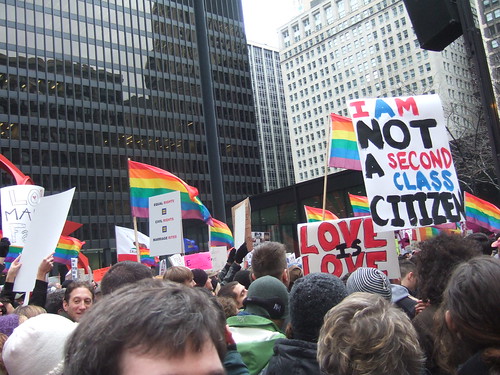2. Having media to directly represents the interests of people of color is needed because it seems that the media now is controlled by white people. But, rather than continue to push each other away, the better action would be to have more awareness from the mainstream media to all types of people. I believe for the most part, interests of minorities are similar to Caucasians' interest... but they aren't exactly the same. For example, although President Obama's recent announcement on Mexico-U.S. border regulations effects everyone, news coverage of "what this means?" will be received differently for different races. I believe that the more the multicultural issues appear on mainstream news, the more mainstream society will begin to understand their importance.
 3. In the beginning, the war was reported in a positive manner. The media showed a sense of support for Bush's decision to go to war and they took the angle that war was necessary to respond to the attacks on America on Sept. 11. The media reported that Saddam Hussein was behind those attacks and made us believe going to war was necessary to defend ourselves. We were told that our freedom was at risk because of the supposed weapons of mass destruction. Most people believed what the media was reporting because they had no reason not to. There was an attack on our country and we believed our rights were in jeopardy, so when the media put a name and a face to those attacks we supported fighting back.
3. In the beginning, the war was reported in a positive manner. The media showed a sense of support for Bush's decision to go to war and they took the angle that war was necessary to respond to the attacks on America on Sept. 11. The media reported that Saddam Hussein was behind those attacks and made us believe going to war was necessary to defend ourselves. We were told that our freedom was at risk because of the supposed weapons of mass destruction. Most people believed what the media was reporting because they had no reason not to. There was an attack on our country and we believed our rights were in jeopardy, so when the media put a name and a face to those attacks we supported fighting back.4. When it comes to social protests that have happened recently, I feel that the media has sort of ignored them and brushed them off in a way. Take the Jenna Six for example, I feel like hardly anyone I know could tell me what it is. If I said it was concerning civil rights, most people would probably assume it happened decades ago. As the video pointed out, many anti-war demonstrations barely registered a blip on the news cycles. I assume it's because the media was hesitant of showing people going against the fray on such an issue that was wildly viewed as a positive. I do not care what the particular issue may be, when a large group of people come together to exercise their freedom of speech, it should be covered by the media.
5. Including my thoughts after watching that video in class, I think the media gave the civil rights movement a lot more coverage compared to what social movements today are receiving. I believe all of this press was extremely beneficial because it opened people's eyes to the issues. Even though not all of the coverage was positive, African-Americans were able to get their message out. I would say it was a case of "all press is good press" for the movement. I believe America was curious about African-Americans and their goals, so that was the reason why so much attention was devoted to the movement. Luckily, all the attention helped out.

6. The media's role in setting the agenda is not only a big role, but they have all the power, so they have all the responsibility. And it goes farther than just your local media. In order for me to find out what is going on across the country and the globe, I depend on media outlets across the globe to set a responsible agenda. Minority media coverage is very important and I hope the mainstream will continue to report more and more on these issues. Knowledge is power, and the more different cultures can learn about each other, the better we can work together for the good of all. Media coverage of the war is a tricky because there are so many (passionate) beliefs and opinions on the subject. The media should just stick to covering the facts and reporting fair and equal coverage.

04/03/09
ReplyDeleteWhat fun would that be? Just the facts!!!
ReplyDeleteI totally agree with Chris when he says that the media control everything we see and hear. They definitely put their own angle on every story to how they want us to perceive it. But I also agree with how he says that the media knows that without them we would all be pretty much lost. What would we have to watch and/or listen to? I also like how when Chris was talking about how interests of minorities is probably for the most part similar to Caucasians. We are all human and want to know what is going on in our country so our knowledge about everyday things should probably be the same.
ReplyDeleteYou are totally right on. I think that's the worst thing about this whole assignment is that sooooo many times we rely on the news to educate us that we are actually less educated for it. It's definitely a generational thing. Older people are the first to question the media and look else where for their news where as our generation takes it for face value. Look at half the stuff students write in the daily! With how much undisputed unsupported information they throw all of over the newspaper, we should be outraged. But, overall the campus just shrugs it off. I suppose thats the danger when you allow the media to teach you about the world.
ReplyDeleteI agree with most of what you said.I think the media set the agenda for the War on Terror, but I think public opinion drove them. At a time where disagreeing with the war was to be deemed “anti-American” or “unpatriotic,” I honestly think the media were so afraid of going against public opinion that they fell into line with everyone else. Actually, up until very recently (i.e. the beginning of the 2008 election) did media outlets actually show some distaste in the U.S.’ goals of going to war. And only until very recently did we see President Bush’s approval rating plummet to record lows. Because he was associated with the war, I think the media felt it would be more appropriate to disapprove of the war.
ReplyDeleteToday’s media are afraid, I think, afraid of losing ratings to the point where they concern themselves more about not offending others (leading to a drop in ratings or readership). So really, they’re more afraid of losing market share than actually taking a stance on something.